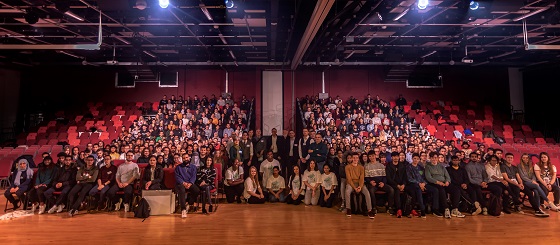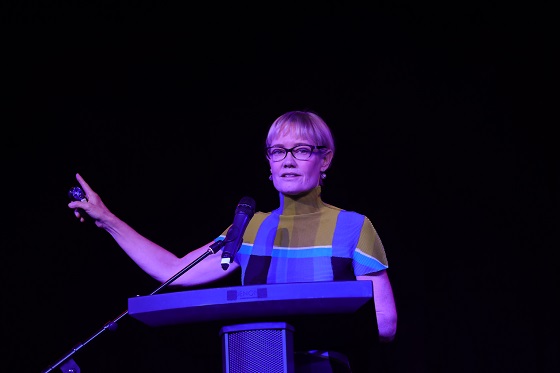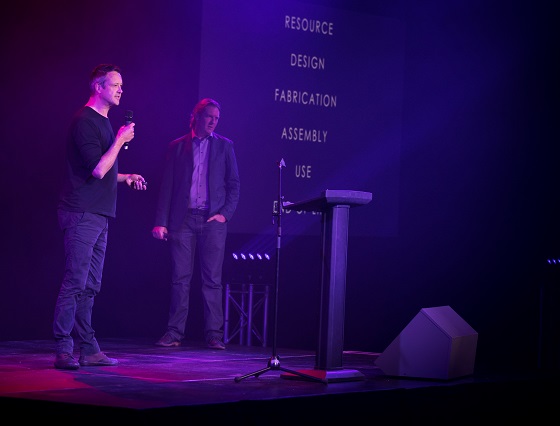The next generation of architects from De Montfort University Leicester (DMU) may have different ideas of what a building should look like, but they are all agreed on one thing - sustainability is key when it comes to good design.
More than 700 undergraduate and post-graduate students from the DMU School of Architecture gathered at The Venue@DMU yesterday to take part in BASE, short for the Big Architecture and Sustainability Event, where they discussed what their future selves might be designing to benefit communities.

Students and staff from the School of Architecture at the start of BASE
They were treated to lectures by top-drawer guest speakers - Matthew Barnett Howland and Oliver Wilton, whose Cork House is short listed for the 2019 RIBA Stirling Prize, and Alison Brooks, who is recognised as one of the finest architects of her generation and the only architect in the UK to have won all three RIBA prizes.
A series of workshops involved students getting together in groups to think and work creatively, such as dreaming up a perfect building for a celebrity and designing the structure in miniature out of paper straws, or coming up with ideas of how society can work in a more sustainable way.
RELATED NEWS
Be inspired. Come to our next DMU Open Day
Architect brings message of thanks to DMU from India
DMU grad to train Russians to tackle climate crisis
Not only did the BASE event inspire students to come up with solutions to creating better buildings, but it also allowed the new cohort of first years to mix with fellow undergrads and post-grads, giving them the perfect introduction to a course that is undeniably demanding but ultimately rewarding.
First year undergrad Maria Houlden, from Essex, said: “I think it is lovely to get involved in the workshops and meet lots of people.
“Sustainability is really important to me so seeing speakers and their work and how successful it has been is encouraging. You see how many opportunities there are to change things for the better and how much impact you can have on society.”

Alison Brooks - one of the finest architects of her generation
Fellow first year Brandon Perry said: “This has given me a better understanding of what is expected of me before I get properly stuck into the course - before all the scary stuff!
“We are learning a lot today by interacting with each other.”
Second year undergrad Moesha Philpott, from Kent, said: “I am interested in sustainable technology. That is key to the future of the industry, whether it is building low-cost sustainable housing for the masses or sourcing alternative materials.
“I think it is more of a duty now for our generation to progress in an environmentally-friendly direction.”
Fellow second year undergrad Savannah Talbott (CORRECT), from Tamworth, said: “I want to develop housing that can be carbon neutral.

RIBA Sterling Prize-nominated Matthew Barnett Howland and Oliver Wilton
“I am not a ‘never been done before’ person when it comes to architecture. I am happy to create something that may have been seen before but do it more efficiently. I want to save my planet.
“Sustainability has to be the number one priority for everything to do with architecture. I don’t think enough people think like that at the moment. Some are still thinking about how to make money.”
Santa Sangar, a second year MArch master’s student, said: “I think this event is really beneficial to everyone. In particular, it gives the new undergraduates an understanding of what will be expected of them. This event can inspire them.
“It is good for the first-year students to be able to ask us questions as we are a few years ahead of them.
“It is a stressful course so we are here to let them know we have been there and we are here to help.”
The event was organised by master’s students Jay Sayer and Joseph Silva, who were delighted with the way it was received by their peers.
Jay said: “I think this has not just been about the challenge of sustainable architecture but also about showing all the architecture students that we are a community. We don’t want barriers between first year undergraduates and post-grad students. We want to help each other.”
Posted on Tuesday 8 October 2019